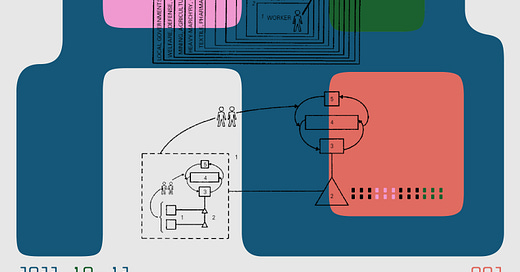Art, Technology and Philosophy Symposium (II) Cybernetics for the 21st Century
8 online lectures and 2 symposiums
We are honored to announce this two years public research program of the Times Museum Media Lab titled “Cybernetics for the 21st Century” aims to firstly reconstruct the history of cybernetics, from the perspectives of different geographical locations, political projects and philosophical reflections; and secondly to ask what might be the contribution of the cybernetic movement to the new form of thinking that is urgently needed to understand and reorient our digital earth. The first edition of the program consists of eight lectures and two symposiums with the presentation of philosophers, historians of science, and sociologists, including Andrew Pickering, Katherine Hayles, Brunella Antomarini, Slava Gerovitch, David Maulén de los Reyes, Michal Krzykawski, Mathieu Triclot, Daisuke Harashima. The program is hosted by Yuk Hui and curated by Jianru Wu.
Host: Media Lab of Guangdong Times Museum, Research Network for Philosophy and Technology
Co-Organizer: Hanart Forum
The launch of the program is made possible by the support of M Art Foundation
Agenda
28 October 2022, Cybernetics in Britain, by Andrew Pickering
04 November 2022, Cybernetics Across Cultures: The Localization of the Universal, by Slava Gerovitch
11 November 2022, Cybernetics and Communism: Cybernetic Thinking in the Polish People’s Republic, by Michał Krzykawski
18 November 2022, Why Did Cybernetics Disappear in Latin America? An Incomplete Timeline, by David Maulén de los Reyes
25 November 2022, Leibniz' Teleology, or A Pre-history of Cybernetics, by Brunella Antomarini
02 December 2022, Cybernetics for the 21st Century? Or Ontology and Politics of Information in the First Cybernetics, by Mathieu Triclot
09 December 2022, Life-in-formation: Cybernetics of Heart (Cybernetics for the 21st Century), by Daisuke Harashima
16 December 2022, Detoxifying Cybernetics: From Homeostasis to Autopoiesis and Beyond, by N. Katherine Hayles
Cybernetics is not only an ephemeral and contingent event in intellectual history, but rather it presents itself firstly as a new science of machines, which breaks away from the mechanism of the 17th century, that is also the reason for which Norbert Wiener in his 1948 Cybernetics: or the Control or Communication in Machine and Animals could claim that cybernetic machines can live a Bergsonian time, namely a biological, creative and irreversible time, in contradistinction to the Newtonian time, which is mechanical, repetitive and reversible; secondly, as a universal discipline, which is able to unify all other scientific disciplines, and later also disciplines of the social sciences, exemplified by the work of Niklas Luhmann, Heinz von Foerster, Maturana and Varela, later called the Second Order Cybernetics; thirdly as a philosophy, or more precisely the latest development of Western philosophy, that which led to Martin Heidegger’s claim that cybernetics marks the end or completion of Western philosophy and metaphysics.
Today we don’t often hear the term cybernetics in universities, and Heidegger’s assertion that cybernetics marks the end of philosophy may sound reactionary since philosophy departments continue to exist, but cybernetics is no longer in the syllabus of university disciplines. The truth is that cybernetics has already been absorbed in almost all engineering disciplines as well as subjects of art and humanities, notably art, media studies and philosophy of technology, and therefore it has realized what it has promised as a universal method; The significance of cybernetics remains to be questioned and taken far beyond what has been characterized as Californian Ideology and its reminiscence. McLuhan said in an interview in the 1970s that the launch of the Sputnik marks the end of nature and the beginning of ecology. With the later image of the whole earth taken from the satellite in the 1960s, the earth became a veritable artifice, or a spaceship in the sense of Buckminister Fuller. It was also at this turning point that the relation between human, nature, and technology entered a new epoch.
This new epoch is where we are living, and more than ever, we are living in an epoch of cybernetics, however, we still easily fall prey to a dichotomy of nature and culture without really understanding the significance and the limits of cybernetics. We, moderns, are alcoholics, who failed to get out of the positive feedback of progress, like what Nietzsche describes in the Gay Science, the pursuit of the infinite leads to the realization that nothing is more frightening than the infinite. A new recursive epistemology in the sense of Gregory Bateson, which inherits cybernetic thinking while seeking to overcome its intoxication, is needed for the program of re-orientation. This new program can only set off from cybernetics and it can only survive by going beyond cybernetics.





Dear madam, sir, I would like to attend the Art, Technology and Philosophy Symposium (II). How can I attend? Looking forward to your reaction, best regards, Karen Lancel.
P.S: I just made a profile on your website:
ArtScience: work, lecture, publish on social-neurobio-technological AI entanglement. Venice Biennial 2015, Ars ElectronicaFestival Linz, National Museum China. PhD: TU Delft. Awards TASIE2019 TsinghuaUniversity, MondriaanFoundation. www.lancelmaat.nl